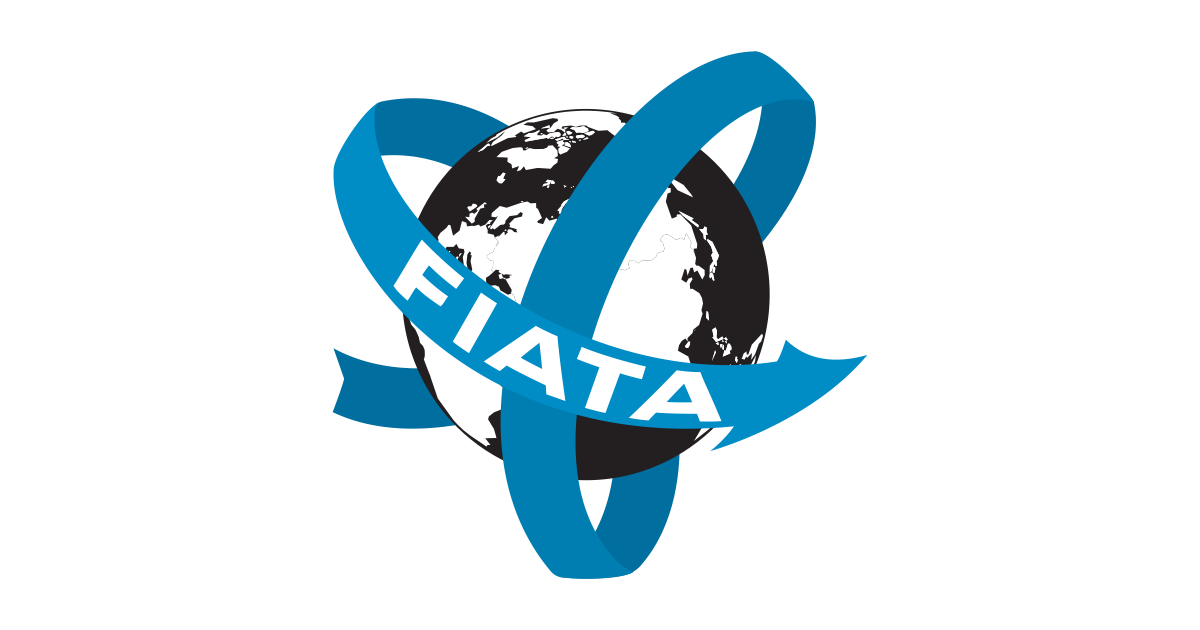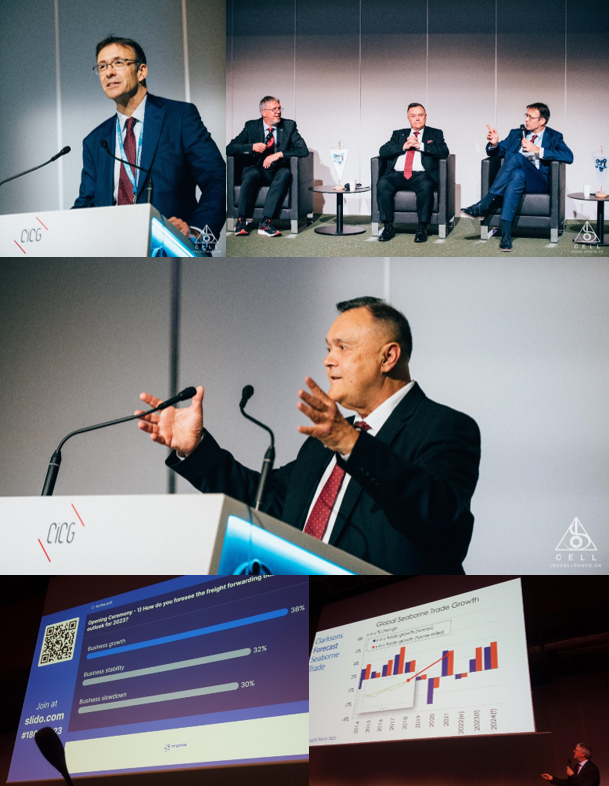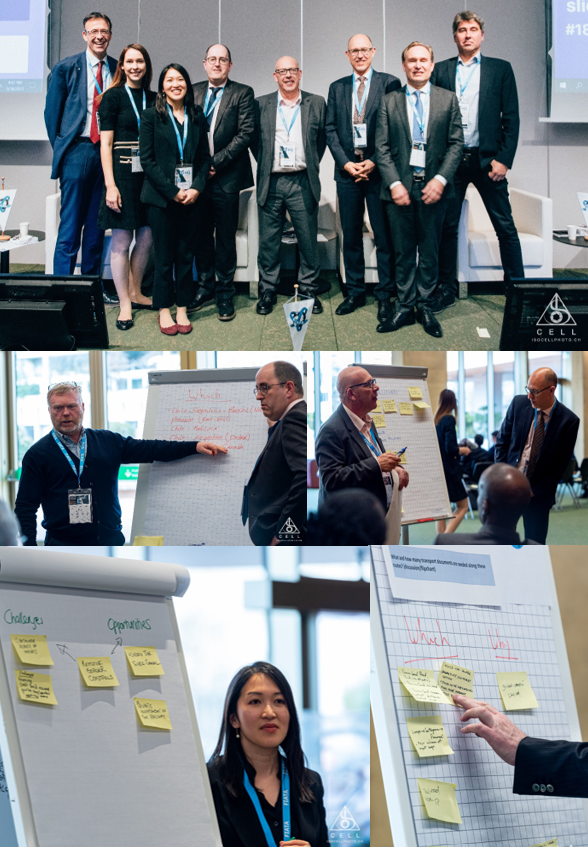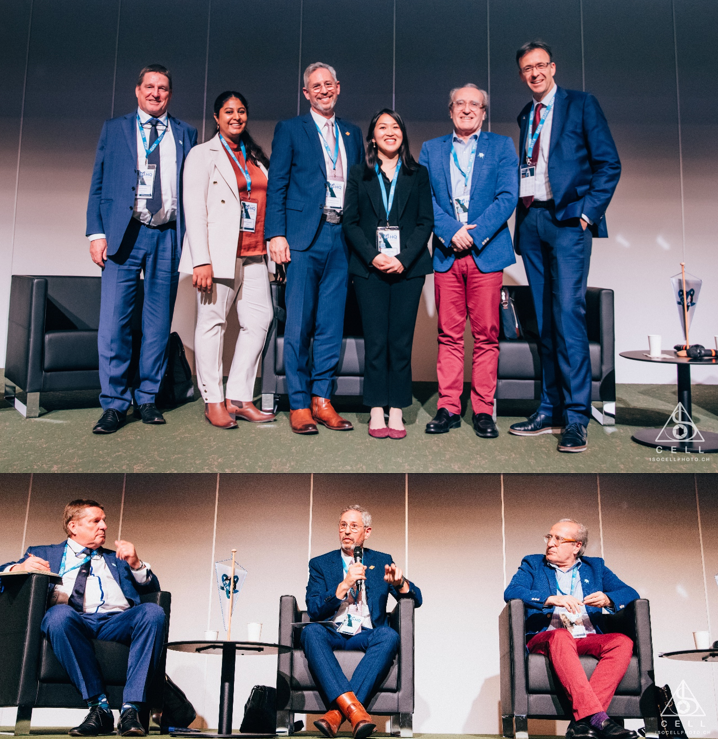
FIATA HQ Meeting: Decarbonisation, Transport Corridors and Multimodality key outcomes
SWITZERLAND : FIATA HQ Meeting 2023, was attended by over 190 participants, from almost 60 countries. The interactive nature of this year’s Meeting enabled members to actively participate in sessions, workshops and group discussions, which enriched the Meeting considerably. At this year’s Meeting, there were many important outcomes which will direct the work of the FIATA HQ Team in the coming months and year. FIATA’s Advisory Bodies and Institutes will be incorporating feedback from members into their work agendas, and continuing their work to improve member services, advocacy in the freight forwarding sector and staying on the front line of the sector and its updates.

Opening Session
FIATA President Ivan Petrov opened the FIATA HQ Meeting officially with a warm welcome to all members, sharing FIATA’s key priorities for 2023, and aims of navigating uncertainty at this year’s FIATA HQ Meeting.
Jan Hoffmann, Head of Trade Logistics at UNCTAD, provided a keynote speech, presenting an outlook on trade and logistics.
He noted that in the past, the industry spent more money on inventory holding than transport, but now it spends twice as much on transport than inventory holding, and not because transporting is more expensive. Dr Hoffmann gave an analysis of the evolution of cargo shipping, noting that the size of ships has increased, and that fewer companies are serving the global supply chain with their services due to this, and larger shipping companies vertically integrating. He also shared results of economic research showing the supply-demand curve evolution over the last years. It was noted that the cost of transport would have to change a lot before a change in supply-demand would be seen. Freight rates have increased since 2021, but the cost of chartering ships has gone up even more.
In closing polls, participants were asked to give their opinions on whether they anticipated business growth, stability or decline in 2023, the slight majority (36%) anticipate growth, with 32% for each respectively expecting business stability, and business slowdown. When asked to comment on this, President Petrov shared that he believes positive business growth comes through luck to those who are brave.
On a second poll question, 68% of participants expect to keep their business size stable in 2023, with 24% reporting business workforce growth, and just 8% expecting to cut their staff numbers. Dr Hoffmann shared insights on the coming automation of many jobs, commenting that this will actually bring positive change for employment figures, with more jobs gained through technological progress. President Petrov, with the forwarder’s perspective, commented that he does not expect a need for a reduction in workforce size at this present time for forwarding businesses, nor a growth, as forwarders learn to navigate changes to the global supply chain and the need to make a profit in times of high inflation rates.
In a final poll, the HQ Meeting participants were asked to rank their anticipated main challenges for the year 2023. Inflation was ranked as number one, followed by competition, economic evolution, digitalisation, compliance, regulation and decarbonisation. Dr Hoffmann shared of his surprise at the low ranking of decarbonisation considering the current global situation with calls for net-zero and IMO goals of 40% reduction of CO2 emissions by 2030, but it became clear in discussion that freight forwarders, who have very little say in global decision-making, are not yet affected by changing government regulation. James Corbett (role) of the World Shipping Council, asked forwarders to consider re-thinking, and preparing themselves for the change, so as to not be punished at a later stage. Dr Hoffmann concluded: “Delaying the change is more costly than the change itself”.

‘Addressing challenges for multimodal transport’
In this first HQ Meeting session, Roel Janssens of the UNECE shared the accomplishments of the work of the Commission’s Inland Transport Committee, which has worked to identify strategic road and rail corridors between Europe and Asia. 9 corridors were prioritised for development from 2005-2020, and successfully reduced transport time from 36 days in 2006 to 16 days and less now.
Sharing on behalf of the UIC, Philip van den Bosch noted the Union’s work on coalition building and its ongoing market watch. He emphasised that railfreight has a limited market share, and that there is a great need for public AND private contribution to the set-up of corridors within countries, and more intermodality.
From a more regional perspective, Murat Seitnepesov of the Greater Caspian Association shared on the significant growth of the Middle Corridor in the wake of the Ukraine-Russia war. He shared that border crossing has become challenging, costs have increased, and there is no customs union to adminstrate the problems. There is also a lack of digitalisation in the area, leading to further issues.
Jens Hügel of the IRU highlighted the driver workforce shortage, noting a 2.6 million driver shortage worldwide. Young people are particularly missing from the workforce, and it is the IRU’s message that the industry is made more attractive not only to young people but also women. Mr Hügel shared the proposition of reducing the legal minimum truck driver age to 18, which currently stands at 21 years old, in order to catch school-leavers before they begin to make decisions to enter other apprenticeships and education. FIATA echoes the importance to make the industry more attractive and particlarly to improve treatment of drivers, who often experience poor working conditions.
The participants of the workshop broke into four groups with different focuses to address regional issues and challenges, as well as opportunities for forwarders transporting in the respective regions. Region Africa & Middle East discussions raised the point that in Africa, there is a surplus of young drivers, and in response, MTI Chair Mark Bromley suggested that discussions should be opened with governments of countries with a lack of drivers. The Europe-Asia corridor group addressed the significant increase in the use of the Middle Corridor, and the importance of improving the resources of this area with the higher demand for its services. Region Americas focused on the improvement of the Latin American transport corridors, and driver shortages were addressed in finer detail by a group led by Jens Hügel and Mark Bromley.

‘Sustainability at what cost?’
The final session of the day was a panel discussion entitled ‘Sustainability at what cost?’. With the aim of demystifying the approach of actors from the commodities, bunkering and shipping sectors who will drive the energy transition, FIATA brought together stakeholders from across the supply chain. The panel, moderated by Ms Andrea Tang (MTI Manager), comprised: commodity industry veteran and biofuels expert Mr Pedro Nonay, Dr James Corbett (World Shipping Council – WSC), Mr Tyler Baron (Minerva Bunkering), and Mr Jens Roemer (FIATA Senior Vice President and Working Group Sea Chair).
The panel explored the nature of new fuel options and their preliminary assessment, including methanol, biofuels, ammonia and LNG, their scalability and the infrastructure that will be needed to support their bunkering.
Advances in the shipping sector were noted, and whilst freight forwarders are not directly implementing these new fuel options in vessels, it was noted that all stakeholders will be impacted by the new technologies, and collaboration is needed to achieve the ambitious climate targets.
Polls from the audience showed that cost and resistance to change were primary challenges, while Mr Roemer noted that customer requests for emissions calculators and options for carbon offsets or more sustainable fuel options will be a key driver.
Speakers reiterated Jan Hoffmann’s apt quote from the FIATA Opening Ceremony: “Delaying the change is more costly than the change itself”, noting the context of pressing climate goals. Mr Roemer highlighted FIATA’s work to provide forwarders with the necessary information to be prepared, and the necessary tools to enable sufficient options for forwarders to offer their customers, including carbon offset options.
Dr Corbett highlighted the decarbonisation mandates at the EU and IMO levels, and shared its envisaged pathways to meet those targets. Mr Roemer emphasised the importance of ensuring that small and medium-sized enterprises (SMEs) are properly considered in the energy transition, with speakers noting that the move to low-carbon, hard to access fuels could lead to significant price hikes before a market-determined equilibrium is reached. In conclusion, Mr Nonay’s words ring true, that the whole industry will need to be aligned and make investments to scale up renewably generated fuels. Regulators will need to provide legal certainty and a carbon pricing mechanism to incentivise the shift to cleaner transport.

